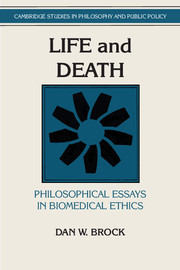Book contents
- Frontmatter
- Contents
- Sources and acknowledgments
- Introduction
- PART I PHYSICIANS AND PATIENTS MAKING TREATMENT DECISIONS
- PART II LIFE-AND-DEATH DECISIONS IN THE CLINIC
- 4 Moral rights and permissible killing
- 5 Taking human life
- 6 Death and dying
- 7 Forgoing life-sustaining food and water: Is it killing?
- 8 Voluntary active euthanasia
- PART III LIFE-AND-DEATH DECISIONS IN HEALTH POLICY
- Index
7 - Forgoing life-sustaining food and water: Is it killing?
Published online by Cambridge University Press: 05 June 2012
- Frontmatter
- Contents
- Sources and acknowledgments
- Introduction
- PART I PHYSICIANS AND PATIENTS MAKING TREATMENT DECISIONS
- PART II LIFE-AND-DEATH DECISIONS IN THE CLINIC
- 4 Moral rights and permissible killing
- 5 Taking human life
- 6 Death and dying
- 7 Forgoing life-sustaining food and water: Is it killing?
- 8 Voluntary active euthanasia
- PART III LIFE-AND-DEATH DECISIONS IN HEALTH POLICY
- Index
Summary
The moral permissibility of patients forgoing life-sustaining medical treatment has come to be widely accepted. The issue of forgoing life-sustaining food and water, however, has only very recently gained attention in public policy discussions. One source of resistance to extending this acceptance of a general right to forgo life-sustaining treatment to the case of food and water has explicitly philosophical origins: for a physician to withhold food and water might seem to be not merely to allow the patient to die, but to kill the patient, and therefore wrong. A closely related moral worry is that for physicians to withhold food and water would be to make them the direct cause of their patients' deaths, which also would be wrong. And finally, many worry that providing food and water is ordinary care, not extraordinary or “heroic,” and so must be obligatory.
In each case, a distinction is drawn – between killing and allowing to die, causing or not causing death, and withholding ordinary or extraordinary care – and in each case it is claimed that the former, though not the latter, is morally forbidden. I consider appeal to the intrinsic moral importance of these distinctions to be confused, both in general and as applied to food and water. In the hope of reducing the impact of these moral confusions in the policy debate about forgoing food and water, I will address here both the general meaning and the putative moral importance of these distinctions, as well as their specific application to the case of food and water.
- Type
- Chapter
- Information
- Life and DeathPhilosophical Essays in Biomedical Ethics, pp. 184 - 201Publisher: Cambridge University PressPrint publication year: 1993



